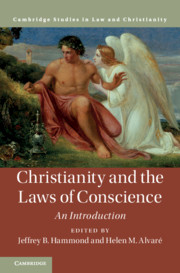Book contents
- Christianity and the Laws of Conscience
- Law and Christianity
- Christianity and the Laws of Conscience
- Copyright page
- Dedication
- Contents
- Contributors
- Acknowledgments
- Introduction
- Part I Themes in Understandings of Conscience in Christianity
- Part II Conscience According to Major Figures and Traditions
- Part III Applied Topics in Law and Conscience
- 15 Liberty of Conscience, Free Exercise of Religion, and the US Constitution
- 16 Religious Conscience Protections in American State Constitutions
- 17 Forced Conformity or Accommodation?
- 18 Christian Conscience and Sexual Expression Rights
- 19 Conscience and the Roman Catholic “Just War” Tradition
- 20 Institutional Conscience, Corporate Persons, and Hobby Lobby
- 21 Religion, Conscience, and the Law
- Index
- References
17 - Forced Conformity or Accommodation?
Reconciling Conscience and Difference in a Pluralistic Democracy
from Part III - Applied Topics in Law and Conscience
Published online by Cambridge University Press: 12 June 2021
- Christianity and the Laws of Conscience
- Law and Christianity
- Christianity and the Laws of Conscience
- Copyright page
- Dedication
- Contents
- Contributors
- Acknowledgments
- Introduction
- Part I Themes in Understandings of Conscience in Christianity
- Part II Conscience According to Major Figures and Traditions
- Part III Applied Topics in Law and Conscience
- 15 Liberty of Conscience, Free Exercise of Religion, and the US Constitution
- 16 Religious Conscience Protections in American State Constitutions
- 17 Forced Conformity or Accommodation?
- 18 Christian Conscience and Sexual Expression Rights
- 19 Conscience and the Roman Catholic “Just War” Tradition
- 20 Institutional Conscience, Corporate Persons, and Hobby Lobby
- 21 Religion, Conscience, and the Law
- Index
- References
Summary
Mark Rienzi observes the tension in the United States' pluralistic democracy between religious diversity and majority rule. He notes that the Supreme Court has forged a path of religious accommodation, versus forced conformity, and this has not led to anarchy. In the past, the Court and legislatures have sometimes pushed limited religious toleration or even forced conformity. Today, the accommodationist path is illustrated in the Court’s second Jehovah’s Witness-pledge case, and in legislative and Supreme Court treatment of conscientious objectors to military service. Conscience protections for those opposed to abortion have been strong Roe v. Wade in 1973. They have been extended to institutions and individuals, and often protect religious and non-religious objections. Even following the Court’s 1990 case curtailing mandatory Free Exercise accommodations, Congress and many states adopted statutory religious conscience protections. Many states interpreted their state constitutions to provide protections for religious freedom. This has not resulted in anarchy but has preserved the ability of many medical professionals and religious social service institutions to continue their services.
Keywords
- Type
- Chapter
- Information
- Christianity and the Laws of ConscienceAn Introduction, pp. 336 - 353Publisher: Cambridge University PressPrint publication year: 2021



